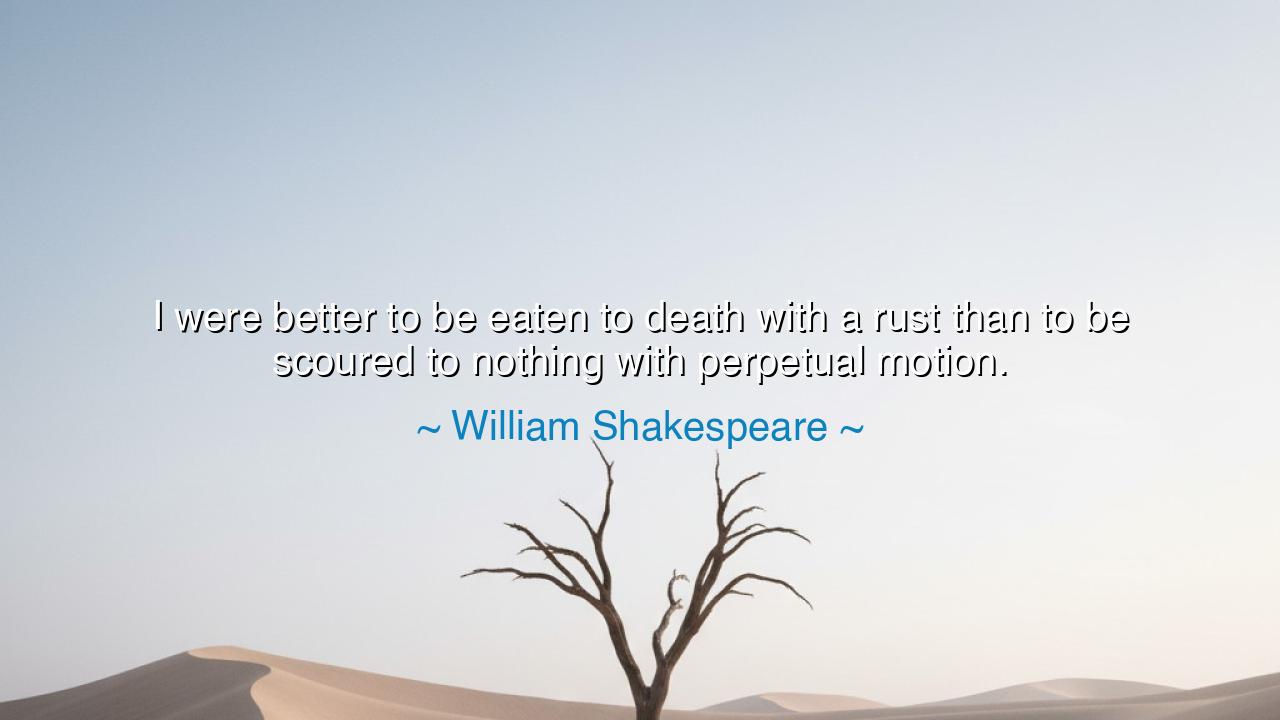
I were better to be eaten to death with a rust than to be scoured
I were better to be eaten to death with a rust than to be scoured to nothing with perpetual motion.






“I were better to be eaten to death with a rust than to be scoured to nothing with perpetual motion.” Thus wrote William Shakespeare, in his play Henry IV, Part II, through the weary voice of Falstaff, the great jester and philosopher of the flesh. Though spoken in jest, this line carries the weight of timeless wisdom. Beneath its humor lies a profound reflection on the nature of labor, rest, and the limits of human striving. Shakespeare, ever the master of the soul’s contradictions, speaks here to the eternal tension between activity and exhaustion, between living fully and being consumed by endless toil.
In the literal sense, rust is the slow decay that comes from idleness, while perpetual motion is the ceaseless labor that wears a man to dust. Falstaff, the old knight, knows both too well. He is mocked as a glutton and sluggard, yet he possesses the rare insight to see that a man who moves without rest—who burns his life in constant striving—destroys himself faster than one who lingers in leisure. To be “eaten to death with a rust” is to die slowly, with dignity and comfort, worn by time; but to be “scoured to nothing with perpetual motion” is to be spent, used up, devoured by ceaseless work and worry until the spirit is gone. Thus, Shakespeare reminds us that the greatest danger of life is not decay—but consumption by restlessness.
This truth is as old as mankind itself. The ancients, too, warned against the tyranny of endless action. The philosopher Seneca wrote that “to rest is not idleness,” and that those who labor without pause mistake motion for meaning. The wise, he said, understand that the soul must breathe as the body does—that there must be silence between notes for the music to exist. Shakespeare, in his own way, echoes this Stoic wisdom through Falstaff’s jesting tongue. The line may make us smile, yet it cuts deep: for in a world that glorifies movement, conquest, and speed, it asks—what becomes of the soul when it forgets how to rest?
Consider the example of Alexander the Great, that blazing star of history. Before the age of thirty, he had conquered the known world. His armies marched from Greece to India, his banners fluttered across deserts and mountains, and the name of Alexander became legend. Yet even as he stood upon the peak of empire, he wept—for there were no more worlds to conquer. His perpetual motion had scoured him to nothing; his body failed, his spirit faltered, and he died young, consumed by his own relentless drive. In him we see Shakespeare’s warning fulfilled: for though glory may shine bright, it burns the soul that never pauses to rest in its own light.
And yet, the opposite danger remains: to rust away in idleness, to live without purpose or motion, is to die before death comes. The farmer who never sows, the scholar who never learns, the heart that never loves—these, too, fall into ruin. Shakespeare does not praise sloth; he merely reminds us that all things must move in rhythm, not frenzy. The sword that lies too long unused will dull, but the sword that is ceaselessly struck against stone will break. Between the two lies the art of balance—the harmony of motion and stillness, of labor and leisure, of being and becoming.
In this way, Falstaff’s earthy wisdom becomes divine truth: moderation is the secret of endurance. The wise man neither rusts nor scours himself away; he knows when to work and when to rest, when to pursue and when to yield. The great poet Homer teaches the same through Odysseus, who endures storms and wars not through constant striving, but through patience, cunning, and timing. It is not the man who runs fastest who wins the race of life, but he who knows when to run, and when to wait.
So, my friends, take heed of the lesson hidden in Shakespeare’s jest. Do not let your soul be consumed by the madness of perpetual motion, for endless labor without joy is but a slow form of death. Yet neither should you rust in idleness, for stagnation is the grave of potential. Instead, live with rhythm—rise early and work with purpose, but let your evenings be filled with peace. Walk steadily, not hastily; seek excellence, not exhaustion. Remember that life, like fire, must be fed gently, not smothered with fuel.
For in the end, as Shakespeare teaches through the laughter of Falstaff, the aim of life is not merely to endure, but to endure wisely. Better to grow old with a touch of rust upon the edges of the soul than to shine for a moment and vanish into nothingness. Rest, therefore, as much as you labor, and let your spirit keep its strength for the long road ahead. In this, you will find the secret that all men seek but few discover—the art of living, neither burned nor broken, but whole.






AAdministratorAdministrator
Welcome, honored guests. Please leave a comment, we will respond soon